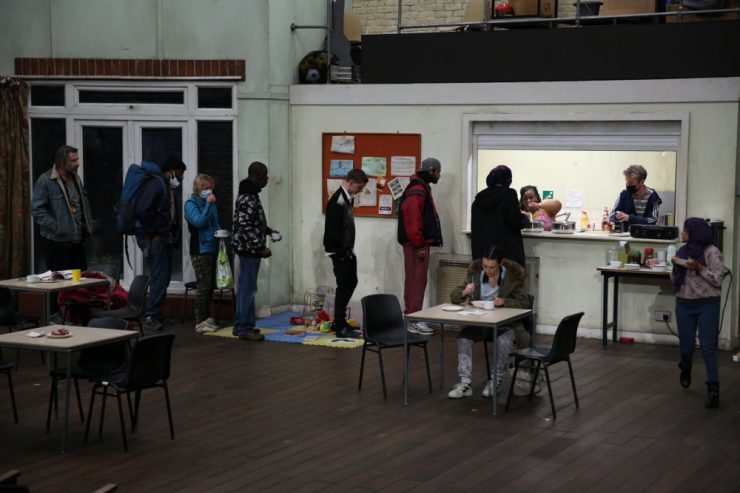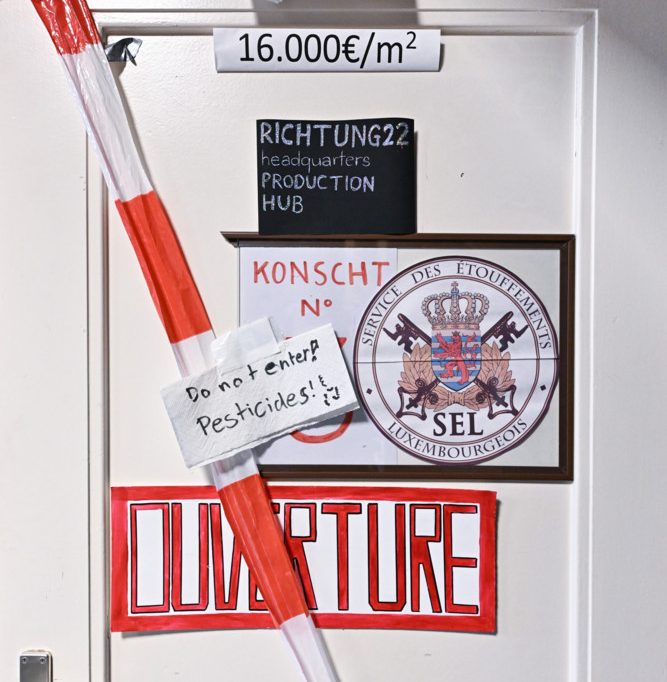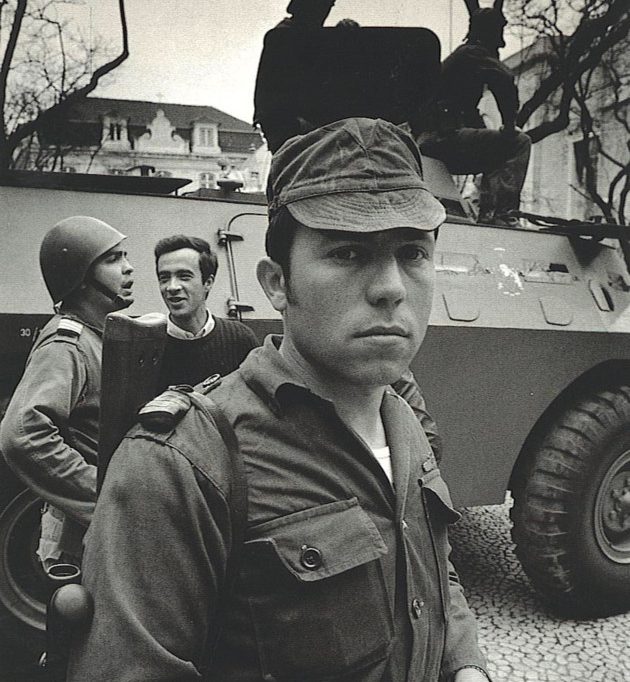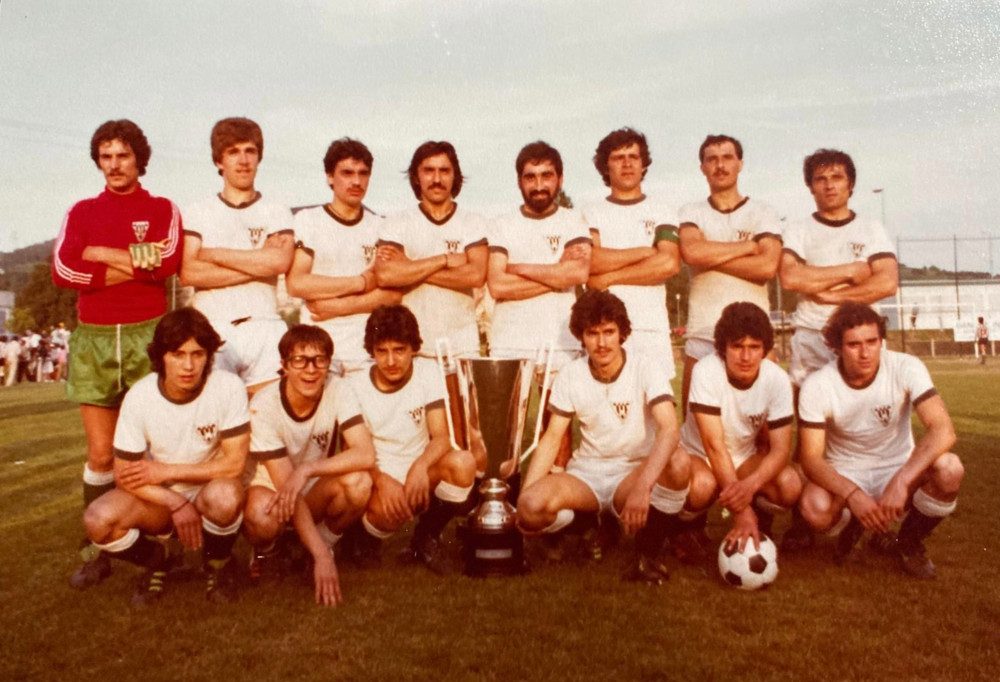Picture a run-down house at the edge of town – the sort of place developers circle around like hyenas, waiting for it to be torn down, overwriting its past with overpriced apartments, embedding its destiny in the big and ineluctable movement towards a gentrified world, erasing the city’s memories, pretending the community of people in need who called this place home never existed.
Picture a middle-aged woman, Hazel (overwhelming: Llewella Gideon), who runs the place by relentlessly and selflessly cooking lunch for those in need. Finally, picture a swarm of not quite homeless people, a very loose community tied together by the sheer need for warmth, both biological and human, for food and for company, a community that proves Hobbes wrong: in the world of the play, the Leviathan isn’t a patchwork of heterogeneous people who stick together because of a common interest – except if you’d consider this interest to be the most basic of all: to simply survive –, the bleak and colourful monster is the outside world, its greedy people, its system of social injustices, its way of crushing those too weak to survive.
Among those in need, there’s Beth (Lucy Black), who’s lost the custody of her daughter Faith because on one fatal day, overworked and distraught, she took too many sleeping pills, not realizing her daughter was on the brink of running away to find her husband Justin, who had just left them. She’s awfully unstable, in her book, everyone and their mother is a cunt, she puts the blame for her loss on her son Marc (Bobby Stallwood), a sensitive, overwhelmed, sad soul who’s permanently worried sick after his mother, she’s an obvious talent for sticking with the wrong kind of men – and yet, like every character in this play, she’s infinitely touching.
There’s Mason (Michael Moreland), a gentle Scotsman who volunteered to set up a choir for all those people and who, in a poignant scene where the stage lights get dimmed („finally“, exclaimed a voice behind me, belonging to a spectator who clearly didn’t understand what this is all about), tells Beth about an impressive succession of foster families he lived in, one from which he got abducted by his very own mother. While many criticized her for it, he tells Beth, he later realized this was her way of telling her son she loved him. Then there’s the violent yet touching Anthony (Joseph Langdon), whose anger is related to the loss of a cherished girl named Charity.
Finally, there’s Bernard, the first to arrive and last to leave, a kind of gentle yet lunatic hobo who is convinced he can’t sing at all yet wants to have a solo part in the choir. He worries about a trapped bird and the incongruous mayfly who shows up far too early, many months before May, and sadly yet funnily comments on the short-lived and absurd existence of an insect living just for one day and doing this at the very wrong moment, poetically commenting on the lives and existences of the community – for the outside world, they are all merely mayflies born at the wrong moment, who are there for a blink of an eye before returning to the big cold nothing. His story, which he’ll tell at the very end, when the place has been sold and the courageous manager is about to hand in the keys, is as heart-wrenching as Hazel’s very own.
On birds, mayflies and salmons
Everything about Alexander Zeldin’s play is meticulously and impressively thought-through: the direction is astoundingly precise and, whereas recent Luxembourgish productions have often hired a choreographer for little to no effect at all, the way these ten characters stroll through or frantically run on stage in a perfectly natural way is nothing short of grandiose. Dialogue is incredibly natural as well, the spectator thus being quick to forget that this are in fact not real people, the play very successfully leading you on to believe this is actually documentary theatre – an impression the fantastic acting of the entire cast helps cement.
„Faith, Hope and Charity“ is the final play of writer-director Alexander Zeldin’s Inequalities Trilogy. While „Beyond Caring“ was about zero hours contracts and „LOVE“ was set in a homeless hostel, this one showcases a community centre that is tragically struggling to survive in a world where those types of places are bulldozed down without much frown or afterthought.
At first sight, this could easily be described as an almost one-to-one-transition of Ken Loach’s social realism to the stage and there are many cues that point towards a certain Loach influence. There’s the fierce yet subtle social criticism in the shape of a merciless portrayal of a country that has been torn apart since the Thatcher years, bearing the weight of social injustice for a very long stretch of time.
And there’s the almost neutral, clinical portrait of the impact of the political on the private up, to a point where the intimate sphere almost vanishes – in a touching scene, a very upset Marc is on the brink of opening up to Hazel when Anthony gets into the community centre, interrupting Marc’s confession, who leaves just as distressed as he showed up: for these people, the community centre is as intimate, as private, as warm as it gets – and yet, they all have to share their solitude with people they don’t really know and don’t necessarily have trust in.
Out of our comfort zone
And yet, for all these semantic and thematic similarities it shares with the work of Ken Loach, Zeldin’s play does things a movie could never have done: „Faith, Hope and Charity“ is theatre at its best, using its very means and idiosyncrasies, the endless possibilities of playing in a room in front of people, not shying away from somewhat radical experimentation – yet all of it within the frame of something that remains narrative theatre with (very) believable characters.
First, due to a U-shaped seating arrangement, part of the audience is permanently on stage, with actors constantly taking place next to the spectators and even slightly interacting with their improvised seating neighbours. Then there’s the apparent chaos of everyone talking at the same time or discussing in different spots, the director impressively using every corner of the set design, a meticulously and beautiful reconstruction of a convincingly shady house that manages to feel homely at the same time.
Finally, there are the lights, which might be both the best (in terms of direction and immersion) and the worst (in terms of comfort of the audience – but that’s exactly the point: there shouldn’t be any comfort watching this) thing about the play. On the outset, we see Hazel getting out of the kitchen and, instead of seeing the lights in the audience fade, she turns them on, the spectator thus being exposed to a yellowish, aggressive light during (almost) the entire duration of the play, which is two hours. The message conveyed here is clear: this ain’t no feel-good theatre where, from the cozy darkness of your seat, you can witness the suffering of others in a cathartic manner.
Far from it: the lightning design by Marc Williams tells you that you are a part of this community, that you are – or should be – concerned. This is no classical, easy catharsis or a tear-jerking drama that triggers your empathy: you become a part of this world and it if it doesn’t feel very comfortable, that’s because it isn’t. This simple effect questions many theatrical habits we have, draws an uncomfortable light on our bourgeois concepts of make-believe and catharsis.
In between the five acts – there are five of them because this is, despite the play being deeply rooted in English social realism, nothing less than a contemporary tragedy –, the room turns completely dark, with ear-crushing white noise and field recordings emerging and stopping as suddenly as they started, the spectators thus having to get accustomed again to the crudeness of light popping up out of nowhere. This idea is as brutal as it is brilliant, as if you’d be awakened from a very noisy dream, only to be thrown back into the harsh reality. The effect reminded me of the title of a song by Australian post-rock band sleepmakeswaves: „A Gaze Blank and Pitiless as the Sun.“
When one finally gets out into the autumnal night, one can’t help but wonder where these fictional characters, whose fictionality is very relative – we know that are people just like them not very far away –, roam, now that their run-down community centre isn’t there anymore. Because even though the house was slowly falling to pieces: it was a place they could call their own.










Sie müssen angemeldet sein um kommentieren zu können